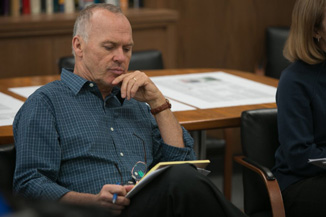|
|
Movie Review: SpotlightBy Ben GruchowNovember 27, 2015
This is a safe target, relatively speaking; it enables the film to posit that the actions of the priests involved aren’t merely the result of individuals making decisions, but also of a rigid and incredibly powerful organization that seeks to protect its own name above anything else, including justice. By keeping the individuals themselves largely off-screen and focusing on the institution, it would already have been able to do this without implicitly excusing the abuse itself. What is shown of the individuals involved is limited to dialogues with several of the victims (now adults of varying ages), and an abbreviated conversation with one of the priests himself. The victims must provide not just the reality of what happened to the journalists, but the detail, and these scenes are harrowing for the simple content, although - strictly speaking - there’s not much of it. These scenes point the story in a different direction, about the emotional cost of what’s been happening and the mental and emotional state of the individuals involved. This is a direction that the movie pointedly doesn’t follow, for pragmatic reasons, and it more or less clarifies this with Walter’s utterance of the line of dialogue that ends the movie’s trailer: there is a narrative about mental and emotional damage, and there is a narrative about the corruption of the system, and one of the stories is going to be told. It’s the more indirect of the two, and the less interesting; we know what happens from a procedural standpoint, but not from an emotional one.
|

|
|
|

|
Friday, November 1, 2024
© 2024 Box Office Prophets, a division of One Of Us, Inc.


